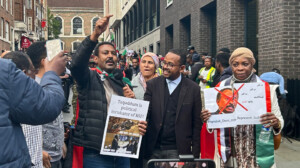Civil society organisations call for reform in Sudan
The Sudanese Professionals Association (SPA) and other civil society organisations call for reform in Sudan. They affirmed their support for civil liberties, a Sudan without discrimination, and separation between religion and state.
 Negotiations between the Transitional Military Council and the Forces for Freedom and Change in July 2019 (SUNA)
Negotiations between the Transitional Military Council and the Forces for Freedom and Change in July 2019 (SUNA)
The Sudanese Professionals Association (SPA) and other civil society organisations call for reform in Sudan. They affirmed their support for civil liberties, a Sudan without discrimination, and separation between religion and state.
In a joint statement, the organisations pointed out that the High Peace Council is unconstitutional. They demanded that the peace process be managed by the Council of Ministers. They also stated that the peace negotiations should be based on issues rather than on tracks.
The High Peace Council, chaired by Lt Gen Abdelfattah El Burhan, comprises all members of the Sovereign Council, the Prime Minister, the Minister of Cabinet Affairs, the Minister of Justice, and the Minister of Federal Government, as well as three experts.
As stipulated in Chapter XV of the Constitutional Declaration, that was signed in August last year by the then ruling Transitional Military Council and the opposition Forces for Freedom and Change (FFC), the High Peace Council deals with issues of comprehensive peace and pursues the dialogue on core issues with all parties to complete the peace process. It also takes confidence-building initiatives and develops public policies related to addressing the roots of the problems in order to achieve a just peace.
The joint statement of the civil society organisations called for a speedy appointment of civilian state governors and the formation of the Legislative Council.
The organisations reject the lifting of subsidies on basic commodities and other “partial solutions” of the government to save the collapsing economy. Economic reform should be planned in an integrated way.
Sudan Call
The members of Sudan Call, a coalition formed by opposition parties, armed movements, and civil society organisations in December 2014, discussed institutional reform of the coalition.
They stated that unity must be reached within the Forces for Freedom and Change (FFC), and that the FFC must present a common vision. They also stressed the need to support the transitional government.
Last week, Omar El Degeir, president of the Sudanese Congress Party, also called for organisational changes within the FFC.
The meeting appealed to the members of the Sudan Revolutionary Front alliance of armed movements to reach a common vision as well.
The Sudan Call members met in Khartoum at the end of April.
Radio Dabanga’s editorial independence means that we can continue to provide factual updates about political developments to Sudanese and international actors, educate people about how to avoid outbreaks of infectious diseases, and provide a window to the world for those in all corners of Sudan. Support Radio Dabanga for as little as €2.50, the equivalent of a cup of coffee.












 and then
and then